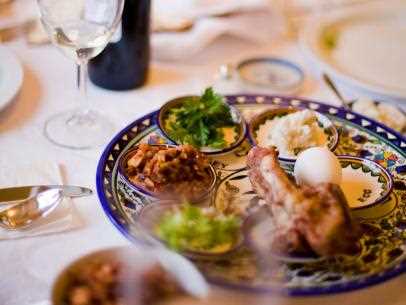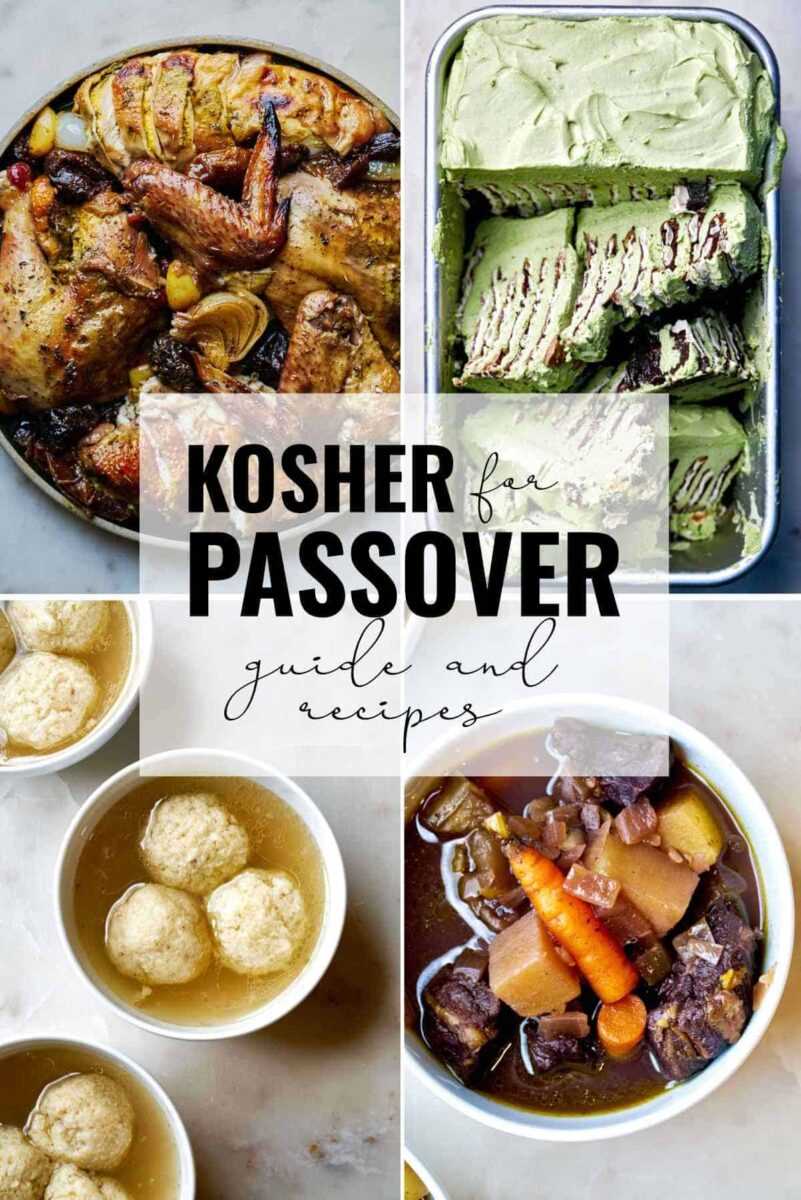Can you cook on Passover?
Passover is an important holiday in the Jewish religion, and it commemorates the liberation of the Israelites from slavery in ancient Egypt. During this holiday, there are specific dietary laws that must be followed, which means that many traditional foods are off-limits. But can you cook on Passover? The answer is yes, with some important restrictions and guidelines.
One of the main restrictions during Passover is the prohibition of leavened products, known as chametz. This includes any food made with wheat, barley, rye, oats, or spelt that has come into contact with water and been allowed to ferment for more than 18 minutes. As a result, bread, pasta, and most grains are not allowed during Passover. However, there are plenty of alternatives and substitutes that can be used to create delicious meals.
When it comes to cooking on Passover, it’s important to use ingredients that are certified as kosher for Passover. This means that they have been prepared and processed according to specific guidelines set out by Jewish law. It’s also important to use separate utensils, pots, and pans for cooking and serving Passover meals, to ensure that no chametz is being mixed in or used.
Despite the restrictions, there are still plenty of delicious dishes that can be prepared on Passover. From traditional dishes like matzah ball soup and gefilte fish, to modern interpretations using creative ingredients, there are endless possibilities for Passover cooking. So, while there are some limitations, you can still enjoy a tasty and fulfilling Passover meal with family and friends.
Can You Cook on Passover?
Passover, also known as Pesach, is one of the most important Jewish holidays. It commemorates the liberation of the Israelites from slavery in Egypt. During this eight-day holiday, there are certain dietary restrictions observed, and one of the questions that often arises is whether cooking is allowed on Passover.
Understanding Passover Dietary Restrictions
Passover dietary restrictions are based on the ancient Jewish tradition of not consuming leavened products, known as chametz. Chametz includes any food or drink that contains wheat, barley, rye, oats, or spelt that has come into contact with water and been allowed to ferment and rise. During Passover, only unleavened bread, called matzah, is allowed to be eaten.
Additionally, many Ashkenazi Jews avoid eating kitniyot, which includes legumes, corn, rice, and various seeds during Passover. Sephardic Jews, on the other hand, do consume kitniyot during the holiday.
Cooking on Passover
According to Jewish law, cooking is permitted on Passover. However, there are specific guidelines that must be followed to ensure that the food remains kosher for Passover. All ingredients used in cooking must be certified as kosher for Passover, and utensils, pots, and pans used for cooking must be cleaned thoroughly and not have been used with chametz during the rest of the year.
Many traditional Passover dishes can still be cooked during the holiday using kosher for Passover ingredients. For example, dishes like matzah ball soup, gefilte fish, and brisket can all be prepared for Passover, as long as the necessary precautions are taken.
It’s important to note that while cooking is allowed on Passover, some households may choose to avoid cooking altogether during the holiday. This might be due to personal or family traditions, or a desire to minimize the risk of using non-kosher for Passover ingredients or utensils.
In conclusion, cooking is generally allowed on Passover as long as the food is prepared using kosher for Passover ingredients and following the necessary guidelines for Passover dietary restrictions. However, individual customs and practices may vary, so it’s always important to consult with a rabbi or follow personal family traditions when it comes to cooking on Passover.
Traditional Rules for Passover Cooking

Passover, also known as Pesach, is a significant Jewish holiday that commemorates the liberation of the Israelites from slavery in ancient Egypt. During this holiday, there are strict dietary restrictions followed by those who observe the Passover laws. These restrictions include not consuming or using any leavened products, Chametz, which traditionally includes bread, pasta, and most grains.
Kosher for Passover
To ensure compliance with the Passover dietary laws, all foods prepared or consumed during this holiday must be “Kosher for Passover.” This designation indicates that the product has been produced in accordance with Jewish dietary laws specifically for Passover, with no contact with any Chametz. Specifically, it means that the product does not contain any Chametz ingredients or any trace of Chametz, has been prepared using utensils that have not come into contact with Chametz, and has been produced in a facility that has been thoroughly cleaned and prepared for Passover.
Ingredients and Substitutions

During Passover, there is a wide range of ingredients and substitutions that can be used to create delicious and satisfying meals while adhering to the dietary restrictions. Some commonly used ingredients during this holiday include matzo meal, potatoes, eggs, and vegetables. These ingredients can be used in various recipes to create dishes such as matzo ball soup, potato kugel, and vegetable casseroles.
Additionally, there are many Passover-friendly substitutes for Chametz ingredients. For example, instead of regular flour, matzo meal or potato starch can be used in baking. Instead of pasta, dishes can be made with gluten-free alternatives such as quinoa or rice noodles. It is essential to carefully read labels and verify that the ingredients used are indeed Kosher for Passover.
| Allowed Foods | Restricted Foods |
|---|---|
| Matzo | Bread |
| Vegetables | Pasta |
| Chicken | Barley |
| Fish | Oats |
| Eggs | Wheat |
Passover cooking requires careful attention to ingredients and preparation methods to ensure compliance with the traditional rules. By utilizing Passover-friendly substitutions and adhering to the Kosher for Passover guidelines, individuals can create delicious meals that honor the holiday’s dietary restrictions.
Permissible Foods for Passover Cooking
During the Passover celebration, there are certain dietary restrictions that must be followed. These restrictions are based on Jewish religious traditions and are observed to honor the Israelites’ liberation from slavery in Egypt. In order to ensure that your meals are compliant with Passover laws, it is important to be aware of the permissible foods that can be used for cooking.
Here is a table outlining the different categories of food that are considered permissible for Passover cooking:
| Category | Permissible Foods |
|---|---|
| Meat | Kosher meat, such as beef, lamb, or chicken |
| Fish | Kosher fish, such as salmon or trout |
| Fruits and Vegetables | All fresh fruits and vegetables |
| Dairy | Kosher dairy products, such as milk, cheese, and yogurt |
| Grains | Matzah (unleavened bread) and matzah meal |
| Eggs | Kosher eggs |
| Nuts and Seeds | All nuts and seeds |
| Herbs and Spices | All herbs and spices (excluding those mixed with grains or legumes) |
| Oil | Pure oils, such as olive oil or vegetable oil |
It is important to note that during Passover, foods containing leavened ingredients, such as bread, pasta, and cereals, are not permitted. Additionally, any processed foods that may contain leavening agents, such as additives or flavorings, should also be avoided.
By following these guidelines, you can ensure that you are cooking permissible foods for Passover and observe the traditions of this important holiday.
Alternative Cooking Methods for Passover
The Passover holiday can present unique challenges when it comes to cooking. Traditional cooking methods may not be suitable due to dietary restrictions and religious customs. Fortunately, there are alternative cooking methods that can be used during Passover to ensure delicious and kosher meals for family and friends.
One alternative cooking method to consider is grilling. Grilling is a popular cooking method during Passover, as it does not require pots, pans, or utensils that may have come in contact with chametz (leavened foods). Grilling can be done outdoors on a barbecue grill or indoors on a grill pan. This method allows for the preparation of a wide variety of dishes, including meats, fish, and vegetables.
Another alternative cooking method is baking. Baking is a great option during Passover, as it allows for the creation of delicious bread alternatives. Matzo, a traditional unleavened bread, can be used as a base for various recipes, such as pizza, casseroles, and even desserts. Additionally, many kosher for Passover baking mixes and ingredients are available, making it easier than ever to whip up tasty treats.
Steaming is also a popular alternative cooking method during Passover. Steaming retains the natural flavors and nutrients of foods, making it a healthy and delicious option. Vegetables, fish, and even desserts can be steamed to perfection using a steamer basket or an electric steamer. This method is quick, easy, and requires minimal cleanup.
In addition to these alternative cooking methods, it is important to remember that certain ingredients are off-limits during Passover. Foods such as wheat, barley, rye, oats, and spelt are considered chametz and should be avoided. It is also important to ensure that all utensils and cookware used during Passover are kosher for Passover and have not come into contact with chametz.
By exploring these alternative cooking methods and following the dietary restrictions of Passover, you can create delicious and kosher meals that are sure to be enjoyed by all.
| Alternative Cooking Methods for Passover |
|---|
| Grilling |
| Baking |
| Steaming |
Questions and answers
Can you cook on passover?
Yes, you can cook on Passover. However, there are certain restrictions and guidelines that must be followed. The main restriction is that foods containing leavened grains, such as wheat, barley, rye, oats, and spelt, are not allowed to be eaten or cooked during Passover. Instead, Passover-friendly ingredients like matzo meal, potato starch, and specially certified products are used. It is also important to use separate dishes, utensils, and cooking equipment to avoid any cross-contamination with non-Passover foods.
What are some traditional Passover dishes?
Some traditional Passover dishes include matzo ball soup, gefilte fish, brisket, roasted chicken, charoset, and tzimmes. Matzo ball soup is a classic Jewish dish made with matzo meal dumplings in a chicken or vegetable broth. Gefilte fish is a fish dish made from ground fish mixed with various seasonings and poached. Brisket is a slow-cooked beef dish often prepared with onions and red wine. Roasted chicken is a popular main course, and charoset is a sweet paste made from fruits, nuts, and wine. Tzimmes is a sweet carrot and sweet potato side dish cooked with honey or brown sugar.
Are there any specific Passover cooking rules?
Yes, there are specific Passover cooking rules that must be followed. The main rule is to avoid using any leavened grains, such as wheat, barley, rye, oats, and spelt, during Passover. Instead, Passover-friendly ingredients like matzo meal, potato starch, and specially certified products are used. It is also important to use separate dishes, utensils, and cooking equipment to avoid any cross-contamination with non-Passover foods. Additionally, some people have the tradition of refraining from eating any kitniyot, which includes legumes, rice, and corn, during Passover.
Can I use regular flour for Passover cooking?
No, regular flour is not allowed to be used for Passover cooking. During Passover, leavened grains, such as wheat, barley, rye, oats, and spelt, are not allowed to be eaten or cooked. Instead, Passover-friendly ingredients like matzo meal, potato starch, and specially certified products are used. These alternative ingredients help ensure that the food is kosher for Passover and follows the dietary restrictions of the holiday.






